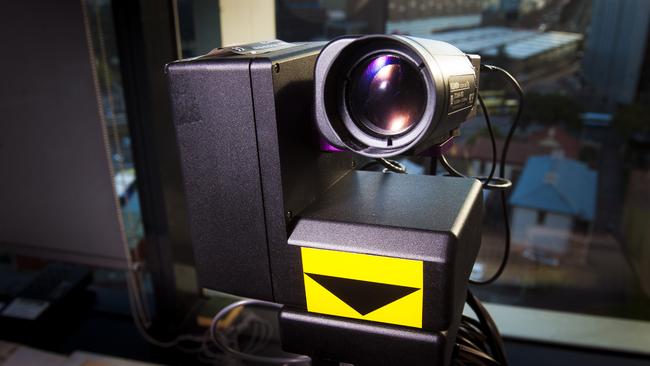Glitch in digital pizza advert goes viral, shows disturbing future of facial recognition tech
YOU may think you’re looking at a pizza advertisement but really, the pizza advert is looking at you.
IMAGINE walking into a store, trying on a jacket but then deciding not to buy.
The next time you walk past the shop and peer into the window you receive a push notification on your phone offering 10 per cent off the jacket, luring you back into the store.
It’s a seemingly harmless scenario but one that could very soon be a reality with increasing use and sophistication of facial recognition technology.
The role this kind of technology plays in the retail industry was highlighted when a glitch in a digital pizza advertisement in Norway went viral recently.
The screen displaying the digital ad offering a two slice deal crashed and in its place was a black screen with words like “male — young adult”, “smile”, “glasses” and “attention time: 2015 out of 4218”.
The software glitch revealed a log of computer commands including descriptions of the people looking at it.
A man identified as Jeff Newman posted a photo of the broken ad on Facebook which promptly went viral on various social media platforms and attracted lots of discussion on reddit.
His intention was to “point out that people may not know that these sort of demographics are being collected about them merely by approaching and looking at an advertisement,” he said on reddit. “The camera was not, at a glance, evident.”
A crashed advertisement reveals the code of the facial recognition system used by a pizza shop in Oslo... pic.twitter.com/4VJ64j0o1a
— Lee Gamble (@GambleLee) May 10, 2017
On a separate reddit discussion, one user who claimed to work with software said this type of thing “really isn’t new”.
“They have computer code that recognises human faces, figures out gender race and measures your emotion and attention span while it displays adverts chosen by an AI to maximise pulling your attention towards itself,” a different user said.
One person who knows first-hand about the power and potential of facial recognition algorithms is Mikhail Ivanov, the CEO of Russian start-up Ntechlab.
Last year his company’s FindFace algorithm won the “MegaFace” facial recognition competition held in the US, beating the likes of Google. This week the company rolled out its emotional intelligence algorithm, which it claims can detect your emotional state with 94 per cent accuracy.
Mr Ivanov believes such technology can be used in surveillance systems for real-time analysis to stop criminals before they act, and will also become a fundamental part of the retail industry, dating apps, fraud prevention, and certain consumer goods.
When it comes to retail, “emotional recognition is able to detect the level of customer satisfaction and analyse the behaviour of the employees,” he told news.com.au.
It will “take its place in the world of the IoT (the internet of Things), integrating into transportation, smart home systems, personal tech and other,” he said.
This week Amazon launched a new version of its smart home speaker adding a screen and camera to the device. If it doesn’t already have it, expect it to soon come with emotion detection software allowing it to understand your mood.

THE CONTROVERSIAL TRADE-OFF
FindFace has been met with controversy in the past prompting concerns over the misuse of the technology.
Last year a Russian artist raised major privacy concerns when he took photos of strangers on the subway and used the FindFace service to identify them by cross referencing the photos he took with those on Russian social media site VK.com
At the time, FindFace said its algorithm could identify someone by that method with 70 per cent accuracy — something the artist’s project seemed to back up.
“Your face is big data” was the prevailing tagline of the project.
Around the same time, FindFace came under fire again when it was used to identify and dox (make personal info such as a phone number or e-mail public) online porn stars.
But Mr Ivanov believes “the non-contact method of human identification” is a force for good.
“We thoroughly monitor the usage schemes of our products and ban those organisations and people who try to use it inappropriately,” he told news.com.au.
As well as having an Android app, the company makes it cloud-based facial recognition system available to corporate, government, and law enforcement clients and last year was reported to be in the final stages of signing a contract with the Moscow city government to work with the city’s network of 150,000 CCTV cameras.
Australia’s law enforcement agencies have been trialling and using facial recognition systems with increasing gusto in recent months. Mr Ivanov said his company has not signed any deals with Australian companies but hopes to do so in the future.
As for the Norwegian pizza joint, the restaurant removed the advert after the awkward glitch made headlines in the Nordic country.
The restaurant chain’s marketing chief said it had removed the video sensors embedded in the adverts from stores because the trial period had ended.



